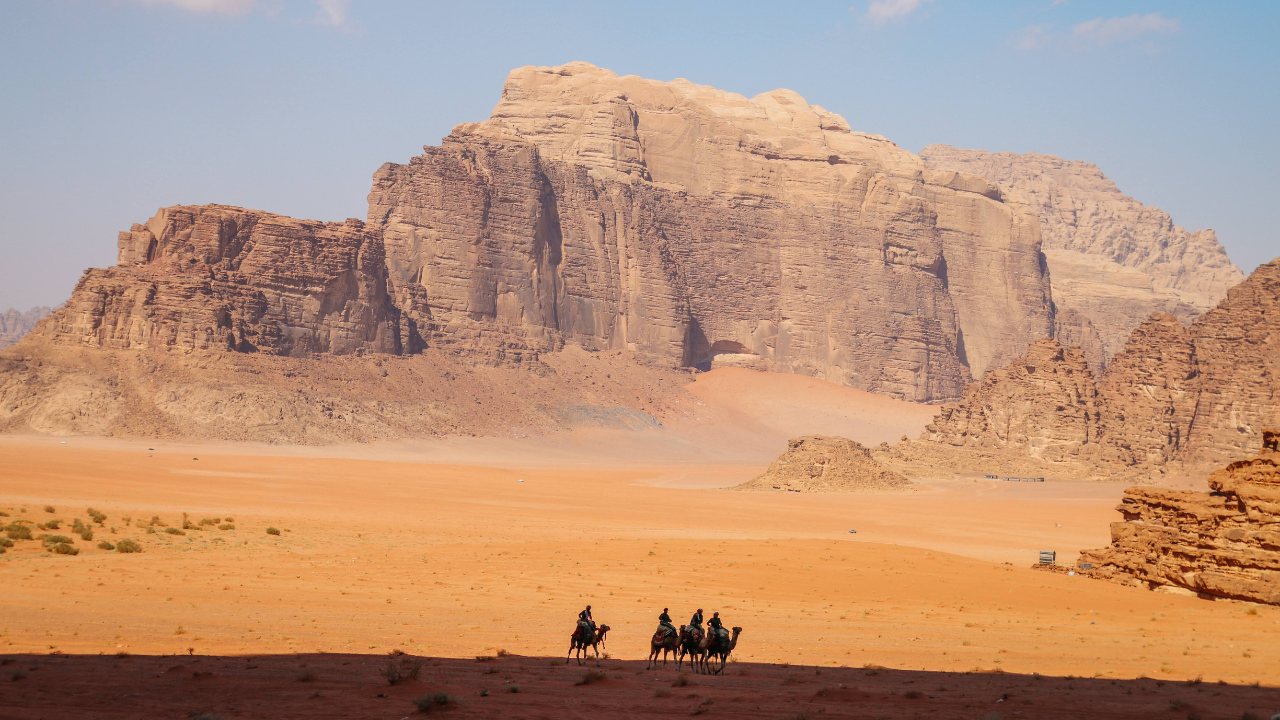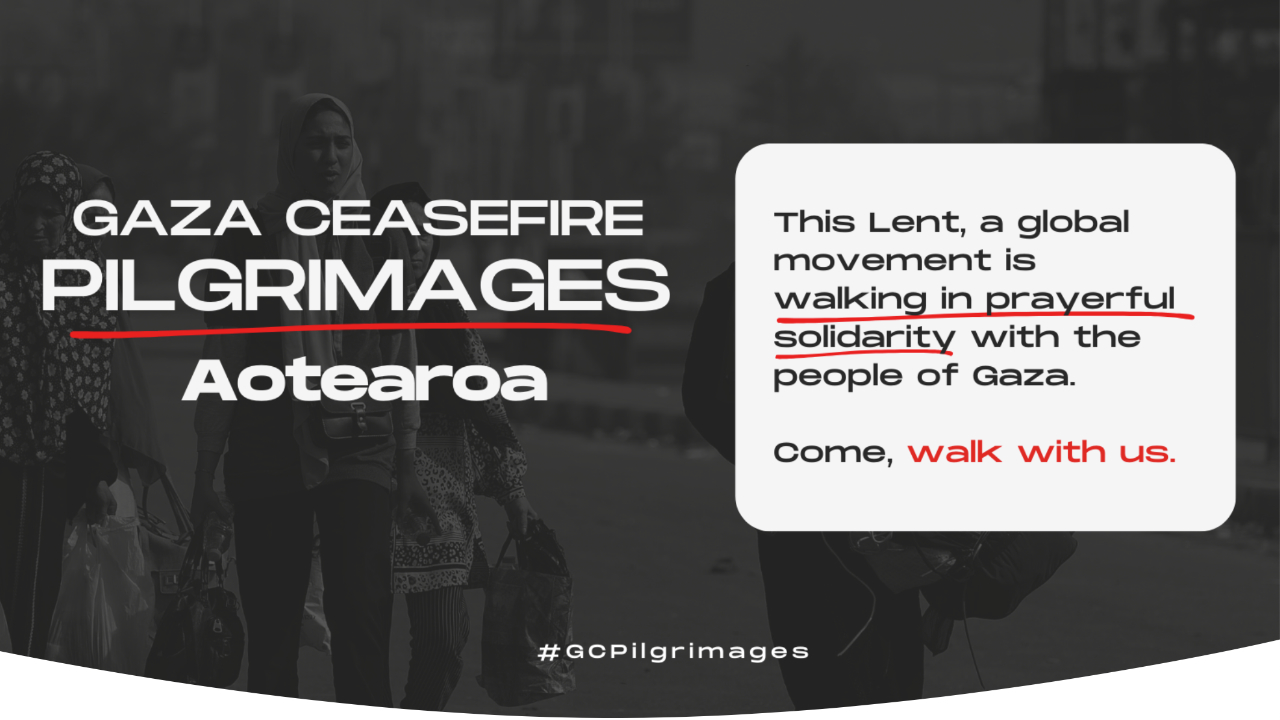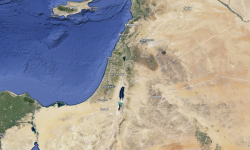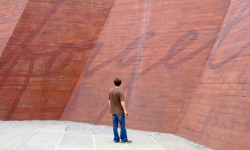
This occasional weekend column called ‘Pondering:…’ is where people from within the 'Team of 40,000 Baptists' can share issues they are thinking about in a way that opens up a topic from a particular perspective. Feel free to comment on these pieces or contribute your own pondering. Opinion pieces are the views of individuals and need to be considered within the context of the diversity of our union of Baptist churches in New Zealand. When commenting or contributing, please follow our Guidelines for articles, opinion pieces and online comments.
This 'pondering' comes from Sophie Fasi-Mohenoa, until recently part of West Baptist Community Church in Taranaki (Sophie and her husband have just moved to Auckland).
Ko Rangitoto te maunga te rū nei taku ngākau.
Ko Moana-nui-a-kiwa te moana e mahea nei aku māharahara.
Nō Tāmaki Makaurau ahau.
E mihi ana ki ngā tohu o nehe, o Tāmaki Makaurau e noho nei au. Kei te noho au kei raro i te maru o Te Pane o Mataoho.
Ko Iriiri te hāhi.
Ko Sophie Fasi-Mohenoa tōku ingoa.
In 2019-2020, I interned at a peace and reconciliation organisation called Musalaha in Israel-Palestine. Musalaha teaches, trains and facilitates reconciliation between Israelis and Palestinians from diverse ethnic and religious backgrounds, based on biblical principles of reconciliation. My time there, working alongside some absolute legends in the field, deeply shaped my worldview and faith. In today’s heightened climate of immense suffering in the Holy Land, in Gaza, it only feels right to share with you from out of this experience.
Relationships, deeply embedded in the Kingdom of God. That’s what my time in Israel-Palestine taught me to live in, and out of. Messy, intricate, honest, intimate, healing, at times extremely painful, at times graciously life-giving, Jesus-centred relationships. Kingdom relationships break down walls between us, stretch our hearts and free our minds. They help us to find out and embrace our true identities and enable us to hold our history as we step forward to reshape tomorrow together. Relationships are at the heart of justice, and that was what my time in the Holy Land helped me to see.
Justice is often described as right and good relationships. It’s about how – physically, emotionally, and spiritually – people flourish through right relationships with God, with each other, with ourselves, and with the earth. I had no idea at the time how right a friend was who gave me some advice as I left New Zealand to live in Israel-Palestine. He said,“To avoid becoming totally overwhelmed, try viewing the conflict through the relationships you form with those around you.” Especially with political corruption and extremism at the top-levels of this conflict, the only way to make sense of the situation and to pursue genuine change is through restorative relationships, from the bottom-up.
One key experience from my time in the Middle East was a trip to Wadi Rum with a new women’s reconciliation group. New groups for reconciliation would intentionally be established on neutral ground, in the desert outside of Israel-Palestine. In this unique space the power imbalance between people groups is somewhat restored. There’s room for open, honest conversations, and Israelis and Palestinians are forced to rely on each other in the challenging conditions, enabling the walls of stereotypes to begin to crumble and friendships to form.
Memories of the vast bright-orange sand dunes and seeing my first ‘moon shadow’ of the mountains on the ground at night are special, but what I’ll remember most is seeing the women open up with their stories and share in each other’s pain of suffering from the conflict; knowing that only from that place could they truly start to resolve it together.
As one young Palestinian woman said to the Israeli wāhine, “Before I came here, I thought you’d be rude to us because that’s all I’ve ever felt at the checkpoints from IDF soldiers; abuse, cursing, mistreatment. But now, knowing you, I love my ‘enemies’, my ‘neighbours’, and I want to live with Jewish people.” Love isn’t easy. Justice isn’t simple. War is hellish. But I’m beginning to see how creating genuine friendships where love and justice co-exist is the only way to create long-lasting reconciliation that transforms our communities, and our world.
Looking through the lens of ‘relationships’, it has become clearer and clearer to me the ugly role that prejudice has to play in conflict. Prejudice: Those uncompassionate, unfriendly attitudes we can so easily feel toward a person who comes from a specific people group, and where we also presume that that person shares negative qualities with the group they come from. Prejudice leads us to believe we’re better than someone else. It’s something we all have, the media included! (Whether or not we’re aware of the single-stories we soak up from them.)
Before I arrived in the West Bank of Palestine, I’ll be honest, I was afraid to live there from what I’d seen on the news. But it was a place where I met some of the kindest, most hospitable people. Like my Palestinian friend at work who bought me gumboots and a hot water bottle when winter came, or the taxi driver who told us to take a different cab that had a cheaper fare than his, or our ‘Palestinian mum’ who made sure to tell her sons, “I love you, I love you, I love you,” at least four times a day. I felt safe and at home there the whole time — “Ahlan wa Sahlan,” as they say, “you are welcome here”. From the moment I arrived in the West Bank, my prejudiced ideas were transformed by loving kindness.
Whether consciously or subconsciously, we develop prejudice due to fear of being threatened in one way or another. The scary thing is, feelings of prejudice never remain simply feelings. They show themselves in our behavior, which, when influenced by prejudice, is often negative. Recognizing these prejudices is so important, and being willing to face them within ourselves and grapple with them in order to move through them is part of the process of reconciliation. It’s making me realise how easy it is to “other” someone else, to let that othering turn into fear, fear into hate, and hate into dehumanising them through our actions.
It’s what I saw so much of in Israel-Palestine from both sides of people groups, from the attitudes held like Israeli’s saying, “It’s not safe for me to go to Bethlehem,” or Palestinian’s believing, “Israelis don’t care about my human rights,” right through to acts of violent hostility against each other. And it’s why engaging with the ‘Contact Hypothesis’ (what the organisation I volunteered for practices) is so important and so powerful; that the more we interact with the other, and the more we truly get to know each other, the less prejudice we will have toward each other, which changes our actions to treasure our shared humanity and cultivate peace.
It’s only through genuinely treasuring people’s humanity, dignity and equality, that our fears are relieved and we find the motivation to face the systemic injustices of a conflict with the courage and belief required to change it together.
That’s why, at the end of the day, the Occupation of Palestine convicts us, as Christians, as peace-makers, to non-violently co-resist against systemic injustices. We can’t deny the entrenched oppression that Palestinians have faced since 1948, like the increasing illegal Israeli settlements, land annexing, youth incarceration, living under Occupation with restricted movement, home demolitions, military violence, a refugee crisis now into its third generation, and a 17-year-long blockade on Gaza by land, air, and sea, to name just some.
The horrific murder of around 1,200 Israelis by Hamas on October 7, 2023, has been met with the horrific murder of over 28,000 Palestinians by the Israeli military and counting, the damage or destruction of 80% of their homes, the obliteration of their healthcare system, 100% of students unable to access education, and the entire population facing starvation. Right now, 1.2 million displaced Gazans are sheltering in Rafah city, the place they were told to evacuate to. This evacuation zone is now facing its own bombardment and a looming ground offensive.
Their reality is a stark reminder that this is not the world God intends for us. As a dear Palestinian friend of mine has said to me, she genuinely sees the future of Palestinian people becoming a situation like what the Native Americans face today, where they’ve either been killed or forced to leave their ancestral homeland to live in specifically designated reservations or ghettos. A future where Palestine is spoken of only in history books.
I wholeheartedly agree that the needs of both Israelis and Palestinians must be met and that they don’t have to be contradictory either. It’s not a zero-sum game where one loses everything and the other wins it all. Rather, as my friend Daniel Bannoura so articulately said, their needs can be met through the prophetic imagination of Christ’s Gospel, “The Kingdom of God comes from within and expands into a banquet of restoration and healing. Where there’s no Jew or Gentile, all are one in Christ Jesus. Lion and lamb lay together. Nations do not hold a sword anymore but beat their swords into plow sheers. Christ rejects violence and oppression and shows us the way of the cross. He provides a new life, and life more abundant.”
But in order to fulfill these needs and resolve intractable conflict, one by one, each of us has to take up the sacrificial call to act for reconciliation. The way of non-violent co-resistance insists the reality of inequalities and inequity between two groups cannot be obscured, overlooked, or bypassed in the authentic pursuit of justice. The might of one of the world’s most powerful militaries cannot be compared to that of the Occupied and impoverished. We must co-resist against Islamophobia, anti-Semitism, and Occupation. Power imbalances must be bravely addressed in order for peace and reconciliation to take shape.
Love and justice go hand-in-hand, you can’t separate the two. So, the question is, are we willing to engage? To grow relationships, deeply embedded in the Kingdom of God? To peel back our prejudice and uphold that every person is made in God’s image? To peacefully co-resist against Empire? To give up our Western privilege of apathy and replace it with solidarity?
Christian leaders in Palestine have called on the global Christian community to respond to the devastation in Gaza. I am part of a peace-activist group called Aotearoa Christians for Peace in Palestine where we’re organising a Pilgrimage as part of our lament and tautoko of them. Our prayer this Lent is that as we reflect on the passion of Jesus and his journey to the cross, we might deepen our prayerful-solidarity with what our Palestinian sisters and brothers are experiencing daily.
On January 14th, 2024, on the Mount of Olives where our Lord wept over Jerusalem, the Gaza Ceasefire Pilgrimage was launched by Palestinian Christians and international Christians standing in solidarity. The idea is simple – walking 41km, the length of Gaza, in prayerful solidarity – and fundraising for Gaza through it.
The campaign has been endorsed by 20 organisations, including Bethlehem Bible College (Palestine), Churches for Middle East Peace and Christ at the Checkpoint, and walks are currently being planned in 109 cities across 15 countries. The following places are planning pilgrimages in Aotearoa: Christchurch (9 March), Auckland (16 March), Whanganui (16 March) and Wellington (28 March).
There are four core demands that the Gaza Ceasefire Pilgrimages are calling for:
- Enduring and sustained ceasefire.
- Immediate flow of life saving food, water, aid, fuel and humanitarian assistance.
- Release of all hostages – both the Israeli hostages held by Hamas – and the Palestinian hostages held in the Israeli prison system.
- End of occupation so a just-peace can begin.
We hope that as a Christian community during Lent, we can lament the suffering being inflicted on Palestinians right now and live into the hope of the redeeming justice of Christ as the realisation of good news for everyone, and a future where the Holy Land is one of peace, equality, and joy for all its people. Join us in a Via Dolorosa of solidarity.
Will you walk with us? Sign up here: commongrace.nz/gazapilgrimages

If you or your church participate in any of these Gaza Ceasefire Pilgrimages, share your experience with us: [email protected]
Read other contributions to our ‘Pondering...’ column here.
Photo credits: Sophie Fasi-Mohenoa


